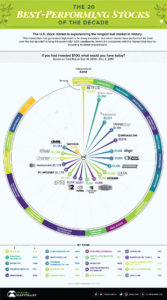Market Action
Global equities reached record highs this week, driven in part by declining trade and geopolitical uncertainty. All three major US indices, as well as the STOXX 600 and MSCI, reached new milestones. The yield on the 10-year US Treasury note rose 9 basis points to 1.92% while the price of a barrel of West Texas Intermediate Crude oil also rose, reaching $60.30. Volatility, as measured by the Chicago Board Options Exchange Volatility Index (VIX), fell 1.3 to 12.3.
The US House of Representatives impeached President Donald Trump on Wednesday. Two articles of impeachment were passed: the first concerns the abuse of power and the second the obstruction of Congress. Speaker of the House, Nancy Pelosi, has yet to transfer the articles to the Senate for trial, and it is unclear when this will occur due to the fact that the House has adjourned until January. Markets showed little reaction to the impeachment unfolding as many believe it is unlikely that Trump will be removed from office by a Republican-led Senate.
On Friday, the United Kingdom’s House of Commons passed Prime Minister Boris Johnson’s Brexit withdrawal agreement. This will allow the UK to exit the European Union at the end of January, ending years of legislative deadlock. A transition period will begin in February wherein the UK will remain a member of the EU customs union and common market until the end of 2020.
India passed a controversial citizenship bill this week. The bill will give some citizens of Afghanistan, Pakistan, and Bangladesh the opportunity to apply for Indian citizenship based on their beliefs, but the bill stipulates that they must be Hindu, Christian, Sikh, Jain, Parsi or Buddhist. Muslims are not listed which has provoked protests from the country’s 200-million Muslim minority.
Lebanese President Michel Aoun has designated former Minister of Education and Higher Education, Hassan Diab, as Lebanon’s new Prime Minister. Hezbollah-backed Diab received more votes in parliament than any other contender. Earlier this month, Prime Minister Saad Hariri resigned after weeks of mass protests. Protests grew particularly violent last weekend, forcing the President to postpone talks about a new Prime Minister.
In Paris this week, public transportation remained at a near-standstill as mass protests continued for a second week. The protests erupted after a new pension reform program was announced by the Prime Minister.
What Could Affect the Markets in the Days and Weeks Ahead
The US Secretary of the Treasury, Steven Mnunchin, said work continues on the details of a phase one trade deal announced by the US and China last week. The secretary said he expects the deal to be signed in early January.
Recent government bond sales and quarterly tax payments have sucked up to $100 billion out of the banking system. The Fed’s repo operations, which are meant to help companies shore up cash levels, have seen heavy demand. This is a potential sign that dealers are trying to get whatever cash they can to avoid year-end shortages.
The US-Mexico-Canada agreement (USMCA) is expected to pass through the Senate early next year. The SECURE Act has been passed through the House and onto the Senate as well. The act is designed to make it easier for people to save for retirement.
This Week From BlackSummit
Assessing the 2020 Outlook: Part I
John E. Charalambakis

